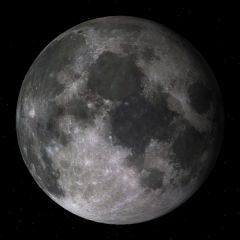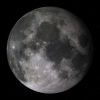Moon
 | This natural satellite related article is a stub. You can help Orbiterwiki by expanding it.
The Moon is Earth's only natural satellite. Its diameter is about one-quarter that of the earth. It is the largest natural satellite as compared to its primary in the solar system and the fifth largest natural satellite in the solar system. It is the only natural body outside of earth that has been visited by humans, the Apollo program from 1969 to 1972. Characteristics[edit]The moon is slightly ellipsoid about 1738 km in radius. The radius of the moon is about a quarter that of the Earth. From the earth's surface the moon's apparent diameter is about half a degree. The gravity on the moon is 1.625 m/s<sup2, about one-sixth of the Earth's gravity, therefore, an object on the moon's surface will weigh about one-sixth as it does on the earth. The surface of the moon consists of rock and dusty regolith, and is comprised of maria, craters, mountains, rifts, and scarps. Surface temperatures range from -171°C (-276°F) during the lunar night to 140°C (284°F) during the lunar day, the surface receives a high amount of ionizing radiation from the sun as well as cosmic radiation. The orbit of the moon is inclined to the ecliptic at about 5°, the only natural satellite in the solar system to do so, the others are inclined to the primary's equator). The moon's rotational axis tilted from the ecliptic about 1.5°. The semi-major axis is about 380000 km. Due to tidal dissipation, the orbit of the moon is slowly increasing at approximately 3.8 cm per year. As the moon is tidally locked to the earth, the same side always faces the earth, except some variation due to libration, from the earth, we are able to see about 59% of the moon's surface over time. The apparent diameter of the moon from the earth's surface is about one-half degree, about the same as that of the sun, so, during solar eclipses, the moon may pass slightly north or south of the center of the sun creating a partial eclipse, or pass close to apoapsis creating an annular eclipse, or covering the entire sun, creating a total eclipse. The sidereal day on the moon is about 27.33 earth days. The moon has a very tenuous atmosphere, but, none is modeled in Orbiter. Moon in Orbiter[edit]The Moon has been a part of Orbiter since the earliest version in 2001, it's orbit defined in the Moon.cfg file. Beginning in Orbiter 2002, its orbit has been defined by the Vsop87.dll file. The stock orbiter has a base, Brighton Beach, located at 33.4375° W, 41.125° N consisting of six landing pads and a number of structures. There are also makers indicating the location of traces of human activity on the moon. Orbiter versions and add-ons which include the Moon as a body.
See also[edit]
| |||||||||||||||||||||||||||||||||||||||||||||||||||||||||||||||||||||||||||||||||||||||||||||||||||||||||||||||||||||||||||||||||||||||||











